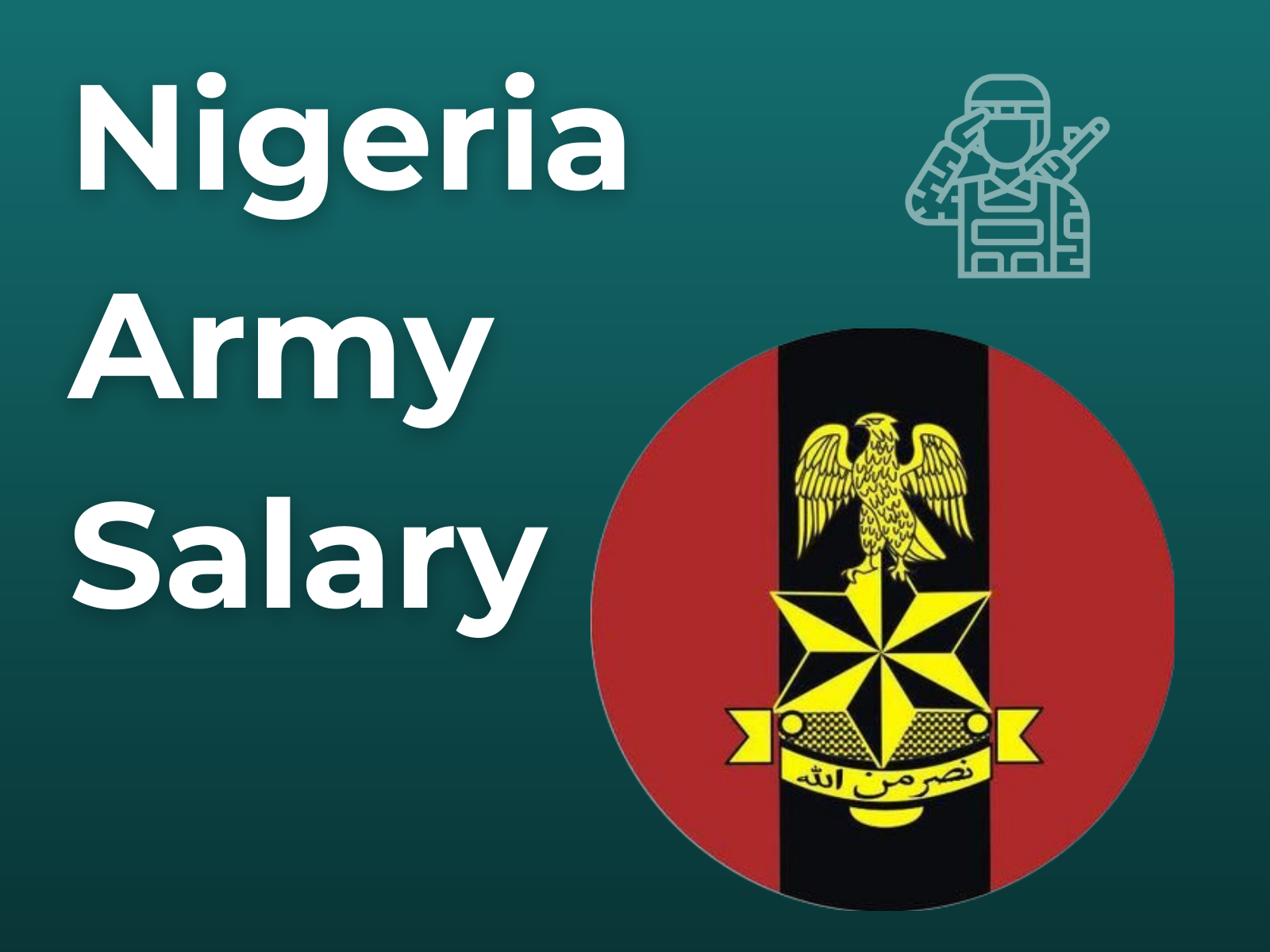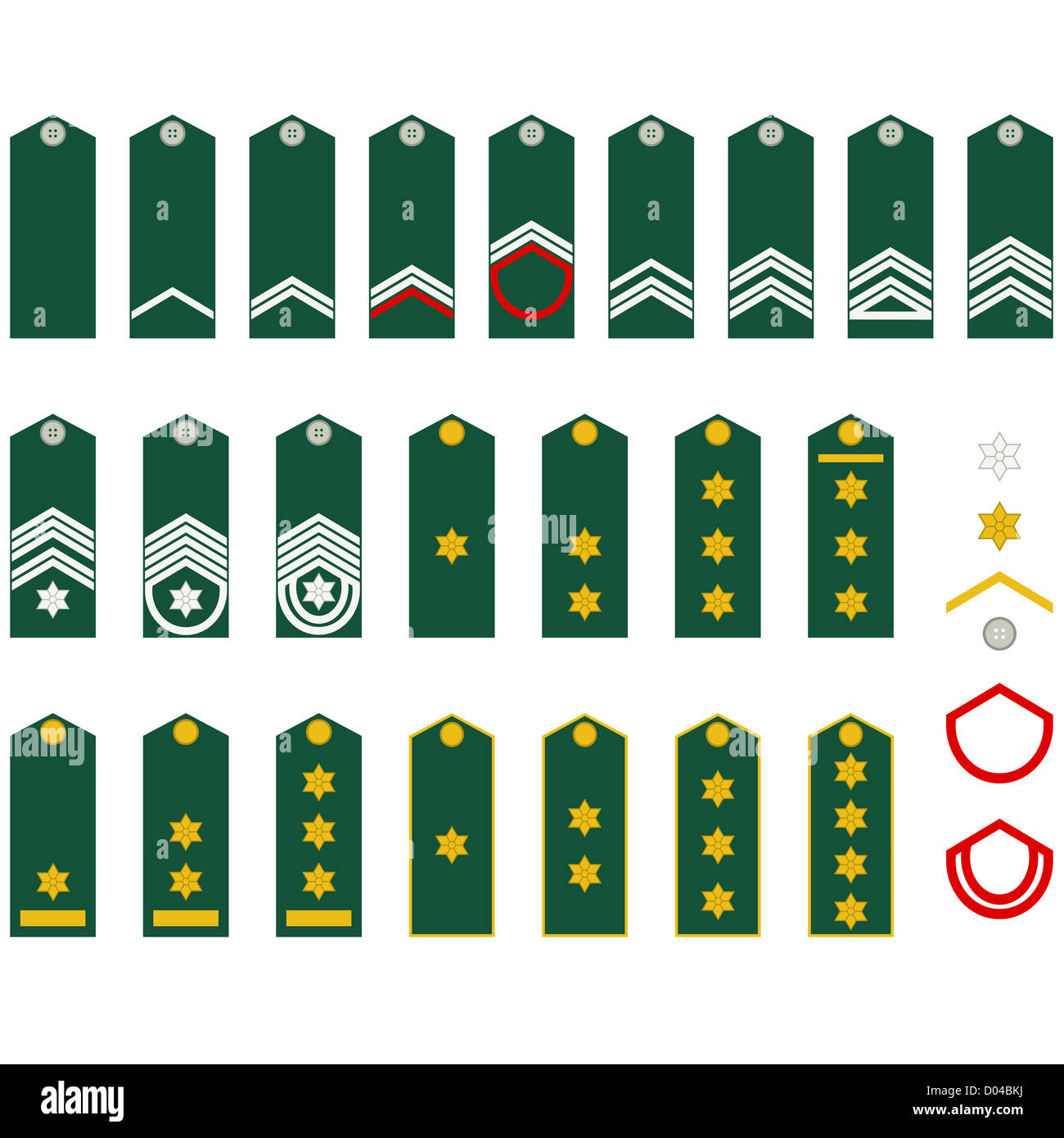Understanding Ranks In Nigerian Army: A Comprehensive Guide
When it comes to ranks in Nigerian Army, there’s more than meets the eye. The Nigerian Army, as one of the largest and most respected military forces in Africa, operates on a structured hierarchy designed to ensure discipline, order, and efficiency. This system of ranks is not just about titles; it’s about responsibility, leadership, and the chain of command that keeps the entire organization running smoothly. Whether you're a prospective recruit, a student of military history, or simply curious about how the Nigerian Army functions, understanding its rank structure is key.
The Nigerian Army has a rich history that dates back to colonial times, evolving into a modern and capable force over the decades. Its rank system reflects this evolution, blending traditional military principles with the unique needs of Nigeria’s defense and security landscape. Each rank carries specific duties and responsibilities, making it an essential framework for anyone looking to join or understand the inner workings of this institution.
From the lowest enlisted soldier to the highest-ranking general, every position plays a critical role in the army's mission. This article will take you through the ranks in Nigerian Army, breaking down what each one means, how they relate to one another, and why they matter. So buckle up because we’re diving deep into the world of military hierarchy!
- Tiffany Stratton Leaks The Truth Behind The Hype And Controversy
- Mckinley Richardson Onlyfans The Rising Stars Journey And Insights
Table of Contents
- Introduction to Nigerian Army Ranks
- Biography of Nigerian Army
- Officer Ranks in Nigerian Army
- Enlisted Ranks in Nigerian Army
- Promotions and Advancements
- Uniforms and Insignia
- Responsibilities of Each Rank
- Importance of Ranks in Military
- Challenges Facing the Nigerian Army
- Conclusion and Final Thoughts
Introduction to Nigerian Army Ranks
Let’s start with the basics. The ranks in Nigerian Army are divided into two main categories: officers and enlisted personnel. Officers are the decision-makers, strategists, and leaders within the force. They hold positions of authority and are responsible for planning and executing missions. On the other hand, enlisted personnel are the backbone of the army, carrying out the orders given by officers and performing the day-to-day tasks that keep the army operational.
Each rank has its own set of responsibilities, requirements, and insignia. For instance, a Lance Corporal (enlisted) has different duties compared to a Captain (officer). Understanding these distinctions is crucial for anyone who wants to navigate the complexities of military life.
Why Are Ranks Important?
Ranks in Nigerian Army serve several purposes. First, they establish a clear chain of command, ensuring that everyone knows who to report to and who is responsible for what. Second, they provide a sense of structure and order, which is vital in high-stakes situations like combat or humanitarian missions. Lastly, they offer a pathway for career advancement, motivating soldiers to strive for higher positions through dedication and hard work.
- Paige Vanzant Ofleaks The Untold Story And Exclusive Insights
- Melannee Raney Age Unveiling The Life And Journey Of A Remarkable Woman
Biography of Nigerian Army
The Nigerian Army has a storied history that dates back to the early 20th century. Originally formed as part of the colonial British forces, it transitioned into a national army after Nigeria gained independence in 1960. Over the years, the army has played a pivotal role in both domestic and international conflicts, earning a reputation as a formidable and disciplined force.
Below is a brief overview of the Nigerian Army’s history and key milestones:
Key Facts About Nigerian Army
- Founded: 1960 (after Nigerian independence)
- Mission: To defend Nigeria’s territorial integrity and provide aid during emergencies
- Structure: Divided into multiple divisions, including infantry, artillery, and engineering
Here’s a quick look at some notable figures and their contributions:
| Name | Rank | Contribution |
|---|---|---|
| General Yakubu Gowon | Chief of Army Staff (1966-1975) | Played a key role in stabilizing Nigeria during the Biafran War |
| General Murtala Muhammed | Chief of Army Staff (1975) | Reformed the army and promoted professionalism |
Officer Ranks in Nigerian Army
Officer ranks in Nigerian Army are the pinnacle of military achievement. These positions require extensive training, education, and leadership skills. Let’s break down the hierarchy:
Top Officer Ranks
- General: The highest-ranking officer, responsible for overall command
- Lieutenant General: Typically leads a division or serves as a senior advisor
- Major General: Commands brigades or holds key administrative roles
These ranks are not just about titles; they come with immense responsibility. For example, a General must oversee operations that involve thousands of troops, while a Major General focuses on smaller but equally important missions.
Enlisted Ranks in Nigerian Army
Enlisted ranks form the backbone of the Nigerian Army. These soldiers are the ones on the front lines, executing orders and ensuring mission success. Here’s a look at some key enlisted ranks:
Basic Enlisted Ranks
- Private: The entry-level rank for new recruits
- Corporal: A junior non-commissioned officer with basic leadership responsibilities
- Sergeant: A mid-level NCO who supervises teams and ensures discipline
Enlisted personnel often work their way up the ranks through years of service and exemplary performance. It’s a testament to their dedication and commitment to the Nigerian Army’s mission.
Promotions and Advancements
Advancing through the ranks in Nigerian Army is no easy feat. It requires a combination of factors, including:
- Performance: Consistently demonstrating excellence in your duties
- Education: Completing relevant courses and training programs
- Leadership: Showing the ability to lead and inspire others
For enlisted personnel, promotions often come after completing specific milestones, such as passing exams or serving a certain number of years. Officers, on the other hand, may need to attend advanced military schools and gain combat experience before moving up the ladder.
Uniforms and Insignia
Uniforms and insignia play a vital role in identifying ranks in Nigerian Army. Each rank has its own unique insignia, which is worn on the uniform to signify position and authority.
Key Insignia Features
- Stars: Used for general officers
- Stripes: Common for enlisted personnel
- Badges: Represent specialized skills or achievements
These symbols are more than just decorations; they serve as a visual representation of a soldier’s rank and accomplishments.
Responsibilities of Each Rank
Every rank in the Nigerian Army comes with specific responsibilities. For example:
Responsibilities of a General
- Overseeing major military operations
- Advising the government on defense matters
- Maintaining discipline and morale across the force
Responsibilities of a Private
- Executing orders from superiors
- Maintaining equipment and weapons
- Participating in training exercises
From the highest general to the lowest private, every soldier plays a vital role in the army’s success.
Importance of Ranks in Military
Ranks in Nigerian Army are more than just titles; they are the foundation of military order. They ensure that everyone knows their role and responsibilities, creating a seamless chain of command. Without this structure, chaos would ensue, especially in high-pressure situations like combat or disaster response.
Additionally, ranks provide a clear path for career advancement, motivating soldiers to excel and strive for higher positions. They also instill a sense of pride and belonging, as each rank carries its own traditions and history.
Challenges Facing the Nigerian Army
Like any large organization, the Nigerian Army faces its share of challenges. Some of the key issues include:
- Resource constraints: Limited funding can hinder training and equipment upgrades
- Security threats: Ongoing conflicts with insurgent groups pose a constant danger
- Modernization: Keeping up with technological advancements in warfare
Despite these challenges, the Nigerian Army continues to adapt and evolve, ensuring it remains a capable and effective force.
Conclusion and Final Thoughts
Understanding ranks in Nigerian Army is essential for anyone interested in the military or Nigeria’s defense capabilities. From the lowest private to the highest general, each rank plays a crucial role in maintaining order, discipline, and effectiveness. Whether you’re a prospective recruit or just a curious reader, this guide has hopefully shed light on the complexities and importance of the Nigerian Army’s rank structure.
So, what’s next? If you’ve found this article helpful, consider sharing it with others who might benefit from the information. And if you have any questions or thoughts, feel free to drop a comment below. Together, let’s continue the conversation about the Nigerian Army and its vital role in shaping the nation’s future!
- Vanessa Bryant Weight Loss Journey Inspiring Transformation And Lessons Learned
- What Is Martha Maccallums Husband Up To A Closer Look At His Career And Life

Nigerian Army Ranks Salary Website Logo Headquarters vrogue.co

Nigerian Army Ranks and Salary Structure 2025 InfoNaijaHub

Nigerian Army Ranks Badges Picture